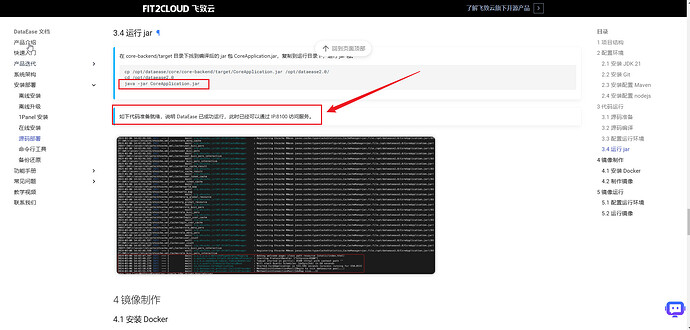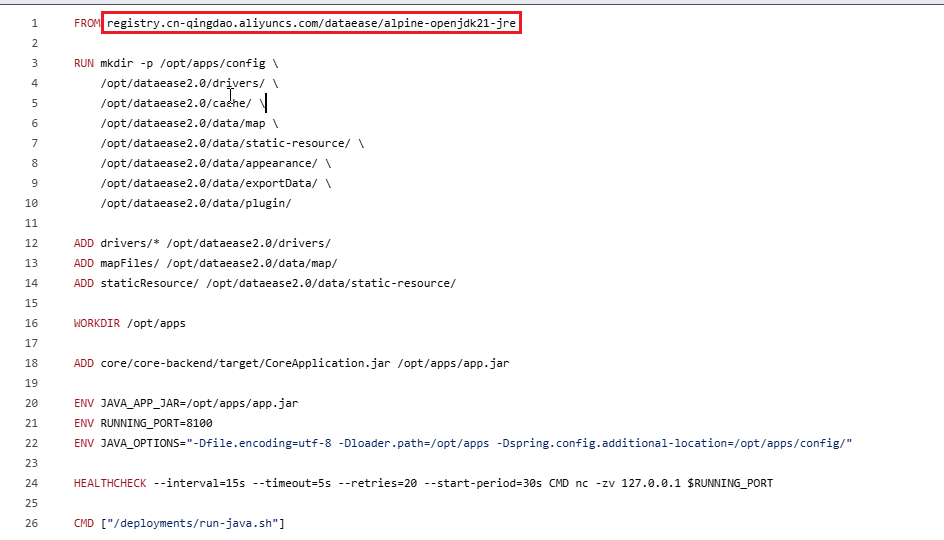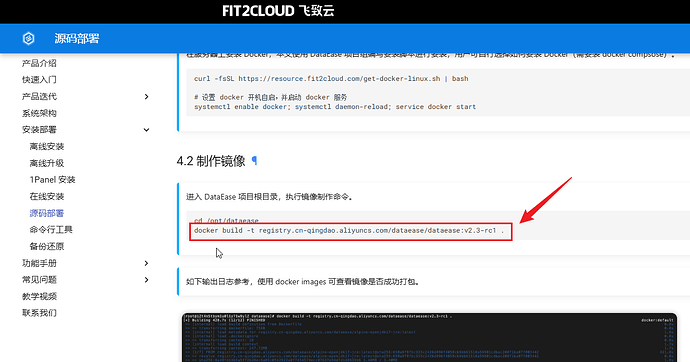版本 v2.9
部署方式源码部署
源码部署成功的,希望进一步制作docker镜像部署
为什么不直接拉官方的镜像,然后改标签名呢,意义何在?
@user-akmxl 大兄弟,我给你弄下来了,你自己复制保存下,论坛不支持上传附件。
run-java.sh
#!/bin/sh
# ===================================================================================
# Generic startup script for running arbitrary Java applications with
# being optimized for running in containers
#
# Usage:
# # Execute a Java app:
# ./run-java.sh <args given to Java code>
#
# # Get options which can be used for invoking Java apps like Maven or Tomcat
# ./run-java.sh options [....]
#
#
# This script will pick up either a 'fat' jar which can be run with "-jar"
# or you can sepcify a JAVA_MAIN_CLASS.
#
# Source and Documentation can be found
# at https://github.com/fabric8io-images/run-java-sh
#
# Env-variables evaluated in this script:
#
# JAVA_OPTIONS: Checked for already set options
# JAVA_MAX_HEAP_RATIO: Ratio use to calculate a default maximum Memory, in percent.
# E.g. the "50" value implies that 50% of the Memory
# given to the container is used as the maximum heap memory with
# '-Xmx'.
# It defaults to "25" when the maximum amount of memory available
# to the container is below 300M, otherwise defaults to "50".
# It is a heuristic and should be better backed up with real
# experiments and measurements.
# For a good overviews what tuning options are available -->
# https://youtu.be/Vt4G-pHXfs4
# https://www.youtube.com/watch?v=w1rZOY5gbvk
# https://vimeo.com/album/4133413/video/181900266
# Also note that heap is only a small portion of the memory used by a JVM. There are lot
# of other memory areas (metadata, thread, code cache, ...) which adds to the overall
# size. When your container gets killed because of an OOM, then you should tune
# the absolute values.
# JAVA_INIT_MEM_RATIO: Ratio use to calculate a default intial heap memory, in percent.
# By default this value is not set.
#
# The following variables are exposed to your Java application:
#
# CONTAINER_MAX_MEMORY: Max memory for the container (if running within a container)
# MAX_CORE_LIMIT: Number of cores available for the container (if running within a container)
# ==========================================================
# Fail on a single failed command in a pipeline (if supported)
(set -o | grep -q pipefail) && set -o pipefail
# Fail on error and undefined vars
set -eu
# Save global script args
ARGS="$@"
# ksh is different for defining local vars
if [ -n "${KSH_VERSION:-}" ]; then
alias local=typeset
fi
# Error is indicated with a prefix in the return value
check_error() {
local error_msg="$1"
if echo "${error_msg}" | grep -q "^ERROR:"; then
echo "${error_msg}"
exit 1
fi
}
# The full qualified directory where this script is located in
script_dir() {
# Default is current directory
local dir=$(dirname "$0")
local full_dir=$(cd "${dir}" && pwd)
echo ${full_dir}
}
# Try hard to find a sane default jar-file
auto_detect_jar_file() {
local dir="$1"
# Filter out temporary jars from the shade plugin which start with 'original-'
local old_dir="$(pwd)"
cd ${dir}
if [ $? = 0 ]; then
# NB: Find both (single) JAR *or* WAR <https://github.com/fabric8io-images/run-java-sh/issues/79>
local nr_jars="$(ls 2>/dev/null | grep -e '.*\.jar$' -e '.*\.war$' | grep -v '^original-' | wc -l | awk '{print $1}')"
if [ "${nr_jars}" = 1 ]; then
ls 2>/dev/null | grep -e '.*\.jar$' -e '.*\.war$' | grep -v '^original-'
exit 0
fi
cd "${old_dir}"
echo "ERROR: Neither JAVA_MAIN_CLASS nor JAVA_APP_JAR is set and ${nr_jars} found in ${dir} (1 expected)"
else
echo "ERROR: No directory ${dir} found for auto detection"
fi
}
# Check directories (arg 2...n) for a jar file (arg 1)
find_jar_file() {
local jar="$1"
shift;
# Absolute path check if jar specifies an absolute path
if [ "${jar}" != ${jar#/} ]; then
if [ -f "${jar}" ]; then
echo "${jar}"
else
echo "ERROR: No such file ${jar}"
fi
else
for dir in $*; do
if [ -f "${dir}/$jar" ]; then
echo "${dir}/$jar"
return
fi
done
echo "ERROR: No ${jar} found in $*"
fi
}
# Generic formula evaluation based on awk
calc() {
local formula="$1"
shift
echo "$@" | awk '
function ceil(x) {
return x % 1 ? int(x) + 1 : x
}
function log2(x) {
return log(x)/log(2)
}
function max2(x, y) {
return x > y ? x : y
}
function round(x) {
return int(x + 0.5)
}
{print '"int(${formula})"'}
'
}
# Based on the cgroup limits, figure out the max number of core we should utilize
core_limit() {
local cpu_period_file="/sys/fs/cgroup/cpu/cpu.cfs_period_us"
local cpu_quota_file="/sys/fs/cgroup/cpu/cpu.cfs_quota_us"
if [ -r "${cpu_period_file}" ]; then
local cpu_period="$(cat ${cpu_period_file})"
if [ -r "${cpu_quota_file}" ]; then
local cpu_quota="$(cat ${cpu_quota_file})"
# cfs_quota_us == -1 --> no restrictions
if [ ${cpu_quota:-0} -ne -1 ]; then
echo $(calc 'ceil($1/$2)' "${cpu_quota}" "${cpu_period}")
fi
fi
fi
}
max_memory() {
# High number which is the max limit until which memory is supposed to be
# unbounded.
local mem_file="/sys/fs/cgroup/memory/memory.limit_in_bytes"
if [ -r "${mem_file}" ]; then
local max_mem_cgroup="$(cat ${mem_file})"
local max_mem_meminfo_kb="$(cat /proc/meminfo | awk '/MemTotal/ {print $2}')"
local max_mem_meminfo="$(expr $max_mem_meminfo_kb \* 1024)"
if [ ${max_mem_cgroup:-0} != -1 ] && [ ${max_mem_cgroup:-0} -lt ${max_mem_meminfo:-0} ]
then
echo "${max_mem_cgroup}"
fi
fi
}
init_limit_env_vars() {
# Read in container limits and export the as environment variables
local core_limit="$(core_limit)"
if [ -n "${core_limit}" ]; then
export CONTAINER_CORE_LIMIT="${core_limit}"
fi
local mem_limit="$(max_memory)"
if [ -n "${mem_limit}" ]; then
export CONTAINER_MAX_MEMORY="${mem_limit}"
fi
}
init_java_major_version() {
# Initialize JAVA_MAJOR_VERSION variable if missing
if [ -z "${JAVA_MAJOR_VERSION:-}" ]; then
local full_version=""
# Parse JAVA_VERSION variable available in containers
if [ -n "${JAVA_VERSION:-}" ]; then
full_version="$JAVA_VERSION"
elif [ -n "${JAVA_HOME:-}" ] && [ -r "${JAVA_HOME}/release" ]; then
full_version="$(grep -e '^JAVA_VERSION=' ${JAVA_HOME}/release | sed -e 's/.*\"\([0-9.]\{1,\}\).*/\1/')"
else
full_version=$(java -version 2>&1 | head -1 | sed -e 's/.*\"\([0-9.]\{1,\}\).*/\1/')
fi
export JAVA_MAJOR_VERSION=$(echo $full_version | sed -e 's/[^0-9]*\(1\.\)\{0,1\}\([0-9]\{1,\}\).*/\2/')
fi
}
load_env() {
local script_dir="$1"
# Configuration stuff is read from this file
local run_env_sh="run-env.sh"
# Load default default config
if [ -f "${script_dir}/${run_env_sh}" ]; then
. "${script_dir}/${run_env_sh}"
fi
# Check also $JAVA_APP_DIR. Overrides other defaults
# It's valid to set the app dir in the default script
JAVA_APP_DIR="${JAVA_APP_DIR:-${script_dir}}"
if [ -f "${JAVA_APP_DIR}/${run_env_sh}" ]; then
. "${JAVA_APP_DIR}/${run_env_sh}"
fi
export JAVA_APP_DIR
# JAVA_LIB_DIR defaults to JAVA_APP_DIR
export JAVA_LIB_DIR="${JAVA_LIB_DIR:-${JAVA_APP_DIR}}"
if [ -z "${JAVA_MAIN_CLASS:-}" ] && [ -z "${JAVA_APP_JAR:-}" ]; then
JAVA_APP_JAR="$(auto_detect_jar_file ${JAVA_APP_DIR})"
check_error "${JAVA_APP_JAR}"
fi
if [ -n "${JAVA_APP_JAR:-}" ]; then
local jar="$(find_jar_file ${JAVA_APP_JAR} ${JAVA_APP_DIR} ${JAVA_LIB_DIR})"
check_error "${jar}"
export JAVA_APP_JAR="${jar}"
else
export JAVA_MAIN_CLASS
fi
}
# Check for standard /opt/run-java-options first, fallback to run-java-options in the path if not existing
run_java_options() {
if [ -f "/opt/run-java-options" ]; then
echo "$(. /opt/run-java-options)"
else
which run-java-options >/dev/null 2>&1
if [ $? = 0 ]; then
echo "$(run-java-options)"
fi
fi
}
debug_options() {
if [ -n "${JAVA_ENABLE_DEBUG:-}" ] || [ -n "${JAVA_DEBUG_ENABLE:-}" ] || [ -n "${JAVA_DEBUG:-}" ]; then
local debug_port="${JAVA_DEBUG_PORT:-5005}"
local suspend_mode="n"
if [ -n "${JAVA_DEBUG_SUSPEND:-}" ]; then
if ! echo "${JAVA_DEBUG_SUSPEND}" | grep -q -e '^\(false\|n\|no\|0\)$'; then
suspend_mode="y"
fi
fi
local address_prefix=""
if [ "${JAVA_MAJOR_VERSION:-0}" -ge "9" ]; then
address_prefix="*:"
fi
echo "-agentlib:jdwp=transport=dt_socket,server=y,suspend=${suspend_mode},address=${address_prefix}${debug_port}"
fi
}
rmi_options() {
if [ -n "${JAVA_ENABLE_RMI:-}" ] || [ -n "${JAVA_RMI_ENABLE:-}" ] || [ -n "${JAVA_RMI:-}" ] || [ -n "${JAVA_RMI_HOST:-}" ]; then
local rmi_port="${JAVA_RMI_PORT:-1100}"
local rmi_host="${JAVA_RMI_HOST:-localhost}"
echo "-Djava.rmi.server.hostname=${rmi_host} -Dcom.sun.management.jmxremote.port=${rmi_port} -Dcom.sun.management.jmxremote.rmi.port=${rmi_port} -Dcom.sun.management.jmxremote.ssl=false -Dcom.sun.management.jmxremote.authenticate=false"
fi
}
# Read in a classpath either from a file with a single line, colon separated
# or given line-by-line in separate lines
# Arg 1: path to claspath (must exist), optional arg2: application jar, which is stripped from the classpath in
# multi line arrangements
format_classpath() {
local cp_file="$1"
local app_jar="${2:-}"
local wc_out="$(wc -l $1 2>&1)"
if [ $? -ne 0 ]; then
echo "Cannot read lines in ${cp_file}: $wc_out"
exit 1
fi
local nr_lines=$(echo $wc_out | awk '{ print $1 }')
if [ ${nr_lines} -gt 1 ]; then
local sep=""
local classpath=""
while read file; do
local full_path="${JAVA_LIB_DIR}/${file}"
# Don't include app jar if include in list
if [ "${app_jar}" != "${full_path}" ]; then
classpath="${classpath}${sep}${full_path}"
fi
sep=":"
done < "${cp_file}"
echo "${classpath}"
else
# Supposed to be a single line, colon separated classpath file
cat "${cp_file}"
fi
}
# ==========================================================================
memory_options() {
echo "$(calc_init_memory) $(calc_max_heap_memory) $(calc_max_metaspace_memory)"
return
}
# Check for memory options and set max heap size if needed
calc_max_heap_memory() {
# Check whether -Xmx is already given in JAVA_OPTIONS
if echo "${JAVA_OPTIONS:-}" | grep -q -- "-Xmx"; then
return
fi
if [ -z "${CONTAINER_MAX_MEMORY:-}" ]; then
return
fi
# Check for the 'real memory size' and calculate Xmx from the ratio
if [ -n "${JAVA_MAX_HEAP_RATIO:-}" ]; then
if [ "${JAVA_MAX_HEAP_RATIO}" -eq 0 ]; then
# Explicitly switched off
return
fi
calc_mem_opt "${CONTAINER_MAX_MEMORY}" "${JAVA_MAX_HEAP_RATIO}" "mx"
# When JAVA_MAX_HEAP_RATIO not set and JVM >= 10 no max_memory
elif [ "${JAVA_MAJOR_VERSION:-0}" -ge "10" ]; then
return
elif [ "${CONTAINER_MAX_MEMORY}" -le 314572800 ]; then
# Restore the one-fourth default heap size instead of the one-half below 300MB threshold
# See https://docs.oracle.com/javase/8/docs/technotes/guides/vm/gctuning/parallel.html#default_heap_size
calc_mem_opt "${CONTAINER_MAX_MEMORY}" "25" "mx"
elif [ "${CONTAINER_MAX_MEMORY}" -ge 7516192768 ]; then
# if above 7gb(maybe neither mem_limit nor CONTAINER_MAX_MEMORY is set), force it to be 1gb.
calc_mem_opt "1073741824" "50" "mx"
else
calc_mem_opt "${CONTAINER_MAX_MEMORY}" "50" "mx"
fi
}
# Check for memory options and set max metaspace size if needed
calc_max_metaspace_memory() {
# Check whether -Xmx is already given in JAVA_OPTIONS
if echo "${JAVA_OPTIONS:-}" | grep -q -- "MaxMetaspaceSize"; then
return
fi
if [ -z "${CONTAINER_MAX_MEMORY:-}" ]; then
return
fi
# Check for the 'real memory size' and calculate MaxMetaspaceSize from the ratio
if [ -n "${JAVA_MAX_METASPACE_RATIO:-}" ]; then
if [ "${JAVA_MAX_METASPACE_RATIO}" -eq 0 ]; then
# Explicitely switched off
return
fi
if [ "${CONTAINER_MAX_MEMORY}" -le 314572800 ]; then
# don't set MaxMetaspaceSize if CONTAINER_MAX_MEMORY below 300MB threshold
return
fi
if [ "${CONTAINER_MAX_MEMORY}" -ge 7516192768 ]; then
# if above 7gb(maybe neither mem_limit nor CONTAINER_MAX_MEMORY is set), force it to be 1gb.
calc_mem_opt "1073741824" "${JAVA_MAX_METASPACE_RATIO}" "X:MaxMetaspaceSize="
else
calc_mem_opt "${CONTAINER_MAX_MEMORY}" "${JAVA_MAX_METASPACE_RATIO}" "X:MaxMetaspaceSize="
fi
fi
}
# Check for memory options and set initial heap size if requested
calc_init_memory() {
# Check whether -Xms is already given in JAVA_OPTIONS.
if echo "${JAVA_OPTIONS:-}" | grep -q -- "-Xms"; then
return
fi
# Check if value set
if [ -z "${JAVA_INIT_MEM_RATIO:-}" ] || [ -z "${CONTAINER_MAX_MEMORY:-}" ] || [ "${JAVA_INIT_MEM_RATIO}" -eq 0 ]; then
return
fi
# Calculate Xms from the ratio given
if [ "${CONTAINER_MAX_MEMORY}" -ge 7516192768 ]; then
# if above 7gb(maybe neither mem_limit nor CONTAINER_MAX_MEMORY is set), force it to be 1gb.
calc_mem_opt "1073741824" "${JAVA_INIT_MEM_RATIO}" "ms"
else
calc_mem_opt "${CONTAINER_MAX_MEMORY}" "${JAVA_INIT_MEM_RATIO}" "ms"
fi
}
calc_mem_opt() {
local max_mem="$1"
local fraction="$2"
local mem_opt="$3"
local val=$(calc 'round($1*$2/100/1048576)' "${max_mem}" "${fraction}")
echo "-X${mem_opt}${val}m"
}
c2_disabled() {
if [ -n "${CONTAINER_MAX_MEMORY:-}" ]; then
# Disable C2 compiler when container memory <=300MB
if [ "${CONTAINER_MAX_MEMORY}" -le 314572800 ]; then
echo true
return
fi
fi
echo false
}
jit_options() {
if [ "${JAVA_MAJOR_VERSION:-0}" -ge "10" ]; then
return
fi
# Check whether -XX:TieredStopAtLevel is already given in JAVA_OPTIONS
if echo "${JAVA_OPTIONS:-}" | grep -q -- "-XX:TieredStopAtLevel"; then
return
fi
if [ $(c2_disabled) = true ]; then
echo "-XX:TieredStopAtLevel=1"
fi
}
# Switch on diagnostics except when switched off
diagnostics_options() {
if [ -n "${JAVA_DIAGNOSTICS:-}" ]; then
if [ "${JAVA_MAJOR_VERSION:-0}" -ge "11" ]; then
echo "-XX:NativeMemoryTracking=summary -Xlog:gc*:stdout:time -XX:+UnlockDiagnosticVMOptions"
else
echo "-XX:NativeMemoryTracking=summary -XX:+PrintGC -XX:+PrintGCDateStamps -XX:+PrintGCTimeStamps -XX:+UnlockDiagnosticVMOptions"
fi
fi
}
# Replicate thread ergonomics for tiered compilation.
# This could ideally be skipped when tiered compilation is disabled.
# The algorithm is taken from:
# OpenJDK / jdk8u / jdk8u / hotspot
# src/share/vm/runtime/advancedThresholdPolicy.cpp
ci_compiler_count() {
local core_limit="$1"
local log_cpu=$(calc 'log2($1)' "$core_limit")
local loglog_cpu=$(calc 'log2(max2($1,1))' "$log_cpu")
local count=$(calc 'max2($1*$2,1)*3/2' "$log_cpu" "$loglog_cpu")
local c1_count=$(calc 'max2($1/3,1)' "$count")
local c2_count=$(calc 'max2($1-$2,1)' "$count" "$c1_count")
[ $(c2_disabled) = true ] && echo "$c1_count" || echo $(calc '$1+$2' "$c1_count" "$c2_count")
}
cpu_options() {
# JVMs >= 10 know about CPU limits
if [ "${JAVA_MAJOR_VERSION:-0}" -ge "10" ]; then
return
fi
local core_limit="${JAVA_CORE_LIMIT:-}"
if [ "$core_limit" = "0" ]; then
return
fi
if [ -n "${CONTAINER_CORE_LIMIT:-}" ]; then
if [ -z ${core_limit} ]; then
core_limit="${CONTAINER_CORE_LIMIT}"
fi
echo "-XX:ParallelGCThreads=${core_limit} " \
"-XX:ConcGCThreads=${core_limit} " \
"-Djava.util.concurrent.ForkJoinPool.common.parallelism=${core_limit} " \
"-XX:CICompilerCount=$(ci_compiler_count $core_limit)"
fi
}
#-XX:MinHeapFreeRatio=20 These parameters tell the heap to shrink aggressively and to grow conservatively.
#-XX:MaxHeapFreeRatio=40 Thereby optimizing the amount of memory available to the operating system.
heap_ratio() {
echo "-XX:MinHeapFreeRatio=20 -XX:MaxHeapFreeRatio=40"
}
# These parameters are necessary when running parallel GC if you want to use the Min and Max Heap Free ratios.
# Skip setting gc_options if any other GC is set in JAVA_OPTIONS.
# -XX:GCTimeRatio=4
# -XX:AdaptiveSizePolicyWeight=90
gc_options() {
if echo "${JAVA_OPTIONS:-}" | grep -q -- "-XX:.*Use.*GC"; then
return
fi
local opts=""
# for JVMs < 10 set GC settings
if [ -z "${JAVA_MAJOR_VERSION:-}" ] || [ "${JAVA_MAJOR_VERSION:-0}" -lt "10" ]; then
opts="${opts} -XX:+UseParallelGC -XX:GCTimeRatio=4 -XX:AdaptiveSizePolicyWeight=90 $(heap_ratio)"
fi
if [ -z "${JAVA_MAJOR_VERSION:-}" ] || [ "${JAVA_MAJOR_VERSION:-}" != "7" ]; then
opts="${opts} -XX:+ExitOnOutOfMemoryError"
fi
echo $opts
}
java_default_options() {
# Echo options, trimming trailing and multiple spaces
echo "$(memory_options) $(jit_options) $(diagnostics_options) $(cpu_options) $(gc_options)" | awk '$1=$1'
}
# ==============================================================================
# parse the URL
parse_url() {
#[scheme://][user[:password]@]host[:port][/path][?params]
echo "$1" | sed -e "s+^\(\([^:]*\)://\)\?\(\([^:@]*\)\(:\([^@]*\)\)\?@\)\?\([^:/?]*\)\(:\([^/?]*\)\)\?.*$+ local scheme='\2' username='\4' password='\6' hostname='\7' port='\9'+"
}
java_proxy_options() {
local url="$1"
local transport="$2"
local ret=""
if [ -n "$url" ] ; then
eval $(parse_url "$url")
if [ -n "$hostname" ] ; then
ret="-D${transport}.proxyHost=${hostname}"
fi
if [ -n "$port" ] ; then
ret="$ret -D${transport}.proxyPort=${port}"
fi
if [ -n "$username" -o -n "$password" ] ; then
echo "WARNING: Proxy URL for ${transport} contains authentication credentials, these are not supported by java" >&2
fi
fi
echo "$ret"
}
# Check for proxy options and echo if enabled.
proxy_options() {
local ret=""
ret="$(java_proxy_options "${https_proxy:-${HTTPS_PROXY:-}}" https)"
ret="$ret $(java_proxy_options "${http_proxy:-${HTTP_PROXY:-}}" http)"
local noProxy="${no_proxy:-${NO_PROXY:-}}"
if [ -n "$noProxy" ] ; then
ret="$ret -Dhttp.nonProxyHosts=$(echo "|$noProxy" | sed -e 's/,[[:space:]]*/|/g' | sed -e 's/[[:space:]]//g' | sed -e 's/|\./|\*\./g' | cut -c 2-)"
fi
echo "$ret"
}
# ==============================================================================
# Set process name if possible
exec_args() {
EXEC_ARGS=""
if [ -n "${JAVA_APP_NAME:-}" ]; then
# Not all shells support the 'exec -a newname' syntax..
if $(exec -a test true 2>/dev/null); then
echo "-a '${JAVA_APP_NAME}'"
fi
fi
}
# Combine all java options
java_options() {
# Normalize spaces with awk (i.e. trim and elimate double spaces)
# See e.g. https://www.physicsforums.com/threads/awk-1-1-1-file-txt.658865/ for an explanation
# of this awk idiom
echo "${JAVA_OPTIONS:-} $(run_java_options) $(debug_options) $(rmi_options) $(proxy_options) $(java_default_options)" | awk '$1=$1'
}
# Fetch classpath from env or from a local "run-classpath" file
classpath() {
local cp_path="."
if [ "${JAVA_LIB_DIR}" != "${JAVA_APP_DIR}" ]; then
cp_path="${cp_path}:${JAVA_LIB_DIR}"
fi
if [ -z "${JAVA_CLASSPATH:-}" ] && [ -n "${JAVA_MAIN_CLASS:-}" ]; then
if [ -n "${JAVA_APP_JAR:-}" ]; then
cp_path="${cp_path}:${JAVA_APP_JAR}"
fi
if [ -f "${JAVA_LIB_DIR}/classpath" ]; then
# Classpath is pre-created and stored in a 'run-classpath' file
cp_path="${cp_path}:$(format_classpath ${JAVA_LIB_DIR}/classpath ${JAVA_APP_JAR:-})"
else
# No order implied
cp_path="${cp_path}:${JAVA_APP_DIR}/*"
fi
elif [ -n "${JAVA_CLASSPATH:-}" ]; then
# Given from the outside
cp_path="${JAVA_CLASSPATH}"
fi
echo "${cp_path}"
}
# Checks if a flag is present in the arguments.
hasflag() {
local filters="$@"
for var in $ARGS; do
for filter in $filters; do
if [ "$var" = "$filter" ]; then
echo 'true'
return
fi
done
done
}
# ==============================================================================
options() {
if [ -z ${1:-} ]; then
java_options
return
fi
local ret=""
if [ $(hasflag --debug) ]; then
ret="$ret $(debug_options)"
fi
if [ $(hasflag --rmi) ]; then
ret="$ret $(rmi_options)"
fi
if [ $(hasflag --proxy) ]; then
ret="$ret $(proxy_options)"
fi
if [ $(hasflag --java-default) ]; then
ret="$ret $(java_default_options)"
fi
if [ $(hasflag --memory) ]; then
ret="$ret $(memory_options)"
fi
if [ $(hasflag --jit) ]; then
ret="$ret $(jit_options)"
fi
if [ $(hasflag --diagnostics) ]; then
ret="$ret $(diagnostics_options)"
fi
if [ $(hasflag --cpu) ]; then
ret="$ret $(cpu_options)"
fi
if [ $(hasflag --gc) ]; then
ret="$ret $(gc_options)"
fi
echo $ret | awk '$1=$1'
}
# Start JVM
run() {
# Initialize environment
load_env $(script_dir)
local args
cd ${JAVA_APP_DIR}
if [ -n "${JAVA_MAIN_CLASS:-}" ] ; then
args="${JAVA_MAIN_CLASS}"
elif [ -n "${JAVA_APP_JAR:-}" ]; then
args="-jar ${JAVA_APP_JAR}"
else
echo "Either JAVA_MAIN_CLASS or JAVA_APP_JAR needs to be given"
exit 1
fi
# Don't put ${args} in quotes, otherwise it would be interpreted as a single arg.
# However it could be two args (see above). zsh doesn't like this btw, but zsh is not
# supported anyway.
echo exec $(exec_args) java $(java_options) -cp "$(classpath)" ${args} "$@"
exec $(exec_args) java $(java_options) -cp "$(classpath)" ${args} "$@"
}
# =============================================================================
# Fire up
# Initialize JAVA_MAJOR_VERSION variable if missing
init_java_major_version
# Set env vars reflecting limits
init_limit_env_vars
first_arg=${1:-}
if [ "${first_arg}" = "options" ]; then
# Print out options only
shift
options $@
exit 0
elif [ "${first_arg}" = "run" ]; then
# Run is the default command, but can be given to allow "options"
# as first argument to your
shift
fi
run "$@"%
1 个赞
牛的,兄弟 ![]()
哦哦要得
![]()



